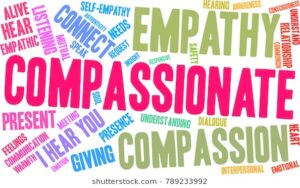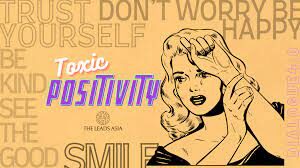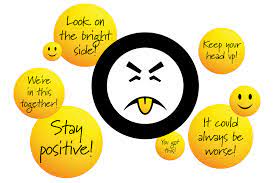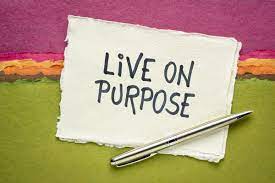by chandiniann | Jan 31, 2023 | Interesting Reads

Image Courtesy:YouMeWe
Empathy is about attempting to understand others by seeing things from their perspective, even if we don’t share their experiences or circumstances. While it’s okay to share our own experiences or make suggestions, it is also important to avoid giving the impression that we have all the answers. Instead, it makes more sense to present one’s experience as a possible option that can be adapted to their situation.
THE BEST KIND OF EMPATHY IS COMPASSIONATE EMPATHY!
Compassionate empathy is a blend of understanding and action to help someone in need. Unlike simply understanding someone’s situation (cognitive empathy), or feeling their pain (emotional empathy), compassionate empathy involves both understanding and taking steps to alleviate the problem.
People facing difficulties often need more than just understanding; they need action to resolve their problems. Compassionate empathy provides a balance between emotion and reason, allowing us to fully grasp another person’s situation and provide the appropriate support.
By exercising compassionate empathy, we can understand another person’s pain as if it were our own and express sympathy, while also remaining in control of our emotions and using reason to make informed decisions and provide the necessary support.
Everyone’s experiences are unique, and what works for one person may not work for another. But that shouldn’t stop us from trying to help. We show that we care and are there for them by DOING what we can.
When struggling to understand someone else’s perspective, it’s helpful to keep the following in mind:
You do NOT have all the information: People have many factors influencing their situation that we may not be aware of.
Perspectives can Change: Our thoughts and feelings about a situation can vary from day to day, depending on our mood and other factors.
Emotional stress can impact behaviour: When under pressure, we may behave differently than expected.
Stop lecturing and badgering those who are struggling, laid off, or are crazy enough to dream VERY big, please! It is critical to better understand others and provide the empathy and support they need. After all, we will all face our own struggles at some point, and it is important to have that same understanding in return.
by chandiniann | Jan 25, 2023 | Interesting Reads

Image Courtesy: Leads Asia
“Often my response to, how are you is, I am Ok.” Instantly, the response I receive is “why only ok”? Or “you should say I am awesome” or “why are you being so negative”.
In these challenging times, with economic recession and widespread social unrest, it’s not uncommon to come across phrases meant to offer comfort and reassurance. However, as well-intentioned as they may be, experts warn against relying too heavily on these “good vibes only” messages. This excessive positivity can be toxic, as it downplays the importance of negative emotions and experiences. #emotionalintelligence
Toxic positivity is the idea that the best way to deal with difficult situations is to put a positive spin on them and avoid dwelling on the negative. This can prevent individuals from fully coping and healthily processing their emotions. Wanting to feel happy all the time can lead to a “secondary emotion” which is an emotion about an emotion. It can also be referred to as “overlay emotion” or “shadow emotion”. This secondary emotion is often disappointment, as people may feel like they are not as happy as they want to be. This accumulation of negative emotions can damage mental health over time. It’s like having “too much chocolate” – it may make us feel better temporarily, but it can ultimately make us sick.
During this era, where anxiety and depression have reached historic levels, toxic positivity can only worsen the situation by preventing people from addressing the serious issues they may be facing. It’s important to remember that it’s okay to not be okay and to allow ourselves to feel and process our emotions. Being gentle and compassionate with ourselves and others during these challenging times is essential. #emotionalintelligence
While it may seem counterintuitive, embracing and processing negative emotions can be beneficial for mental health. Ignoring or invalidating negative emotions can lead to bottling them up, which can lead to a buildup of emotional tension and can manifest into physical and mental health issues. Negative emotions such as sadness, anger, and frustration are a natural part of the human experience and they serve a purpose. They can help us to identify and address problems, and make positive changes in our lives.
Instead of focusing on toxic positivity, it’s important to allow ourselves to feel and process our emotions healthily. This can include talking about our feelings with a trusted friend, journaling, or engaging in self-care activities such as exercise, sports, or meditation.
To shield yourself from toxic positivity, it is important to exercise critical thinking skills, a key skill within the realm of #emotionalintelligence. This can include evaluating the media representation of how people are coping with issues against their reality. By recognizing that you are not alone in your concerns, doubts or lack of motivation, you can reduce the impact of unrealistic expectations that are promoted.
Being aware of ourselves and how we interact with the world is an important aspect of being healthy. If you find yourself spreading toxic positivity, it’s important to stop. This kind of thinking is harmful not only to yourself but also to the people around you. Instead of promoting toxic positivity, strive for balance and the acceptance of both positive and negative emotions. Avoid all-or-nothing thinking.
If you find yourself on the receiving end of toxic positivity, it’s important to set healthy boundaries with those who pass judgment on your emotions and feelings. Speak your truth and don’t let anyone invalidate your experiences. Life is a beautiful, painful, and imperfect journey, and it’s important to embrace it fully. Do it and you will find yourself being able to experience life in its entirety and reap the rewards of living fully.

Image Courtesy:Ed Week.org
by chandiniann | Jan 2, 2023 | Interesting Reads
 ‘
‘
Image Courtesy: Naomi Paper Company
Have you ever felt like something is missing in your life? Like you’re going through the motions and achieving success, but something just doesn’t feel right? If so, you’re not alone. Many people go through life feeling unfulfilled and uncertain about their true purpose. These were some of the thoughts that had been running through my mind for a while.
The good news. I realised that it is possible to find your true purpose and make a difference in the world. It just takes a little bit of self-reflection and a willingness to take a chance on something new.
So, how can you find your true purpose in life and make a difference? Here are a few steps to get you started:
Take some time to think about what matters most to you. What values are most important to you, and how do you want to make a difference in the world?
Reflect on your strengths and passions. What are you naturally good at, and what activities bring you joy and fulfilment?
Consider your experiences and what you’ve learned from them. What challenges have you faced, and how have they shaped you?
Look for opportunities to make a difference. This can be as simple as volunteering your time or donating to a cause you care about, or something bigger like starting your own non-profit or business.
Take action and don’t be afraid to fail. It’s okay if you don’t get it right the first time. The important thing is to keep trying and learning from your experiences.
Remember, finding your true purpose in life and making a difference is a journey, not a destination. It takes time and effort, but the reward of living a fulfilling and meaningful life is worth it. So don’t be afraid to take the first step and start exploring what makes you truly happy and fulfilled.
Finding your true purpose in life and making a difference in the world is not something that can be taught in a lecture – hence this write-up must not be construed as one. True purpose is a deeply personal journey that requires self-reflection, introspection, and a willingness to take risks and try new things.
This process of self-discovery is not always easy, and it may require letting go of preconceived notions and expectations. But it is ultimately a rewarding and fulfilling experience, as it allows you to connect with your deepest values and passions, and to make a meaningful impact in the world.
This process of finding your true purpose is more about self-realization and learning to listen to your own heart and intuition. It is about taking the time to understand who you are and what truly matters to you, and then using that knowledge to make a difference in the world.
NO ONE SAID IT WOULD BE EASY!




